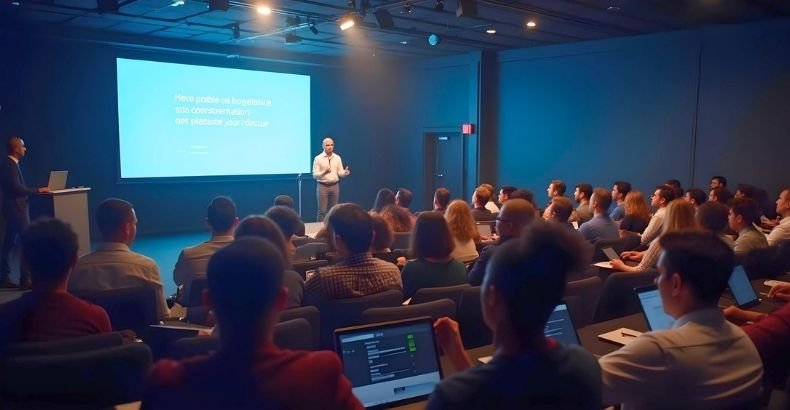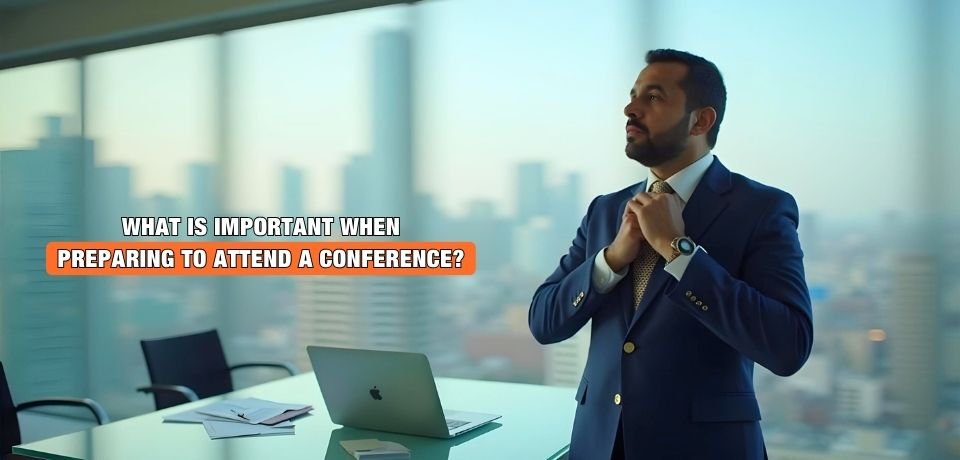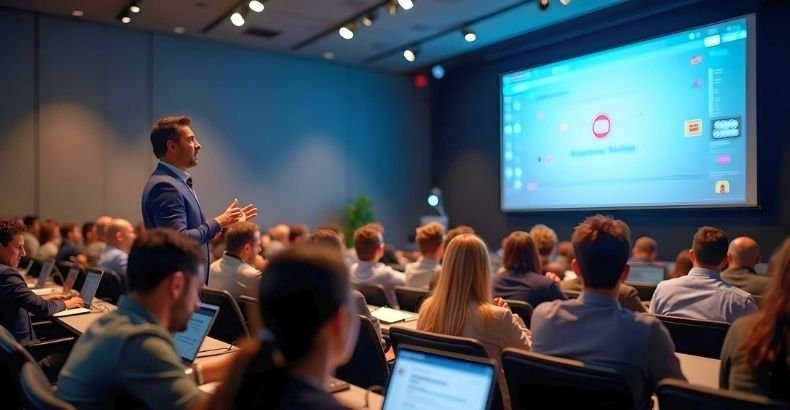When it comes to attending conferences, preparation is the key to success. Proper planning not only improves your experience but also ensures you make the most of the opportunities available. This is where a question might arise: What is important when preparing to attend a conference?
Preparation includes knowing the event’s objectives, researching speakers and sessions, and setting clear personal goals. You’ll also be able to manage the event more effectively if you review the venue layout, participate in pre-conference networking, and manage your materials. These details can significantly impact your overall experience, enabling you to maximize learning and networking opportunities.
Do you want your conference experience to be as rewarding as possible? If so, dive into this article where you’ll find all the necessary information to prepare effectively for your next conference and make it a success!
The Purpose of Attending a Conference
Professionals in a variety of fields benefit from attending conferences. It provides a platform for individuals to gather knowledge, share ideas, and explore new trends in their industry. These events often feature expert speakers, workshops, and networking opportunities that can improve one’s career and personal development.

Networking is a key benefit of attending conferences. Meeting peers and industry leaders allows attendees to develop valuable connections that can lead to collaborations or job opportunities. Conversations sparked at these events can open doors and create lasting professional relationships, which are crucial in today’s competitive environment.
Moreover, conferences are an excellent way to stay updated on the latest advancements and innovations. Participants can gain insights into emerging technologies and best practices that can improve their work. This experience is particularly beneficial for those looking to implement new strategies within their organizations or expand their knowledge base.
For those interested in expanding their network or gaining industry insights, attending upcoming business conferences can be invaluable. These events are designed to facilitate learning and connection, offering attendees the chance to interact with like-minded individuals and thought leaders. Personal and professional growth are tremendous when engaging in such opportunities.
What Should You Expect From a Conference?
A conference can be a fun and educational experience filled with networking and learning opportunities. Participants can expect a variety of sessions, speakers, and activities designed to inspire and educate. Making the most of your event time begins with knowing what to expect. Here’s what you can expect.
Engaging Keynote Speakers
One of the highlights of any conference is the keynote speaker. These individuals are often experts in their fields and share valuable insights and experiences. Attendees can look forward to powerful presentations that motivate and challenge their thinking. Keynote sessions usually set the tone for the entire event, providing themes that resonate throughout the subsequent discussions.
Interactive Workshops
There is usually a range of hands-on workshops offered at conferences. These sessions allow attendees to dive deeper into specific topics, often with direct interaction with experts. Participants can expect practical exercises, group discussions, and real-world applications that strengthen their knowledge. Engaging in workshops helps to solidify knowledge gained from keynote speeches and panel discussions.
Networking Opportunities
Meeting like-minded professionals is an important part of conferences. Attendees can expect various networking events, such as social hours, roundtable discussions, and breakout sessions. These interactions can lead to meaningful connections and collaborations, encouraging relationships that extend beyond the event. Building a strong network is essential for career growth and development.
Panel Discussions
A panel discussion typically includes several industry experts discussing current trends and challenges. These sessions allow attendees to hear different perspectives and engage in inspiring conversations. Expect to witness a dynamic exchange of ideas, with opportunities to ask questions and contribute to the dialogue. Such interactions can provide clarity on complex topics and stimulate innovative thinking.
Exhibitor Booths and Resources
Many conferences feature exhibitor booths showcasing products, services, and innovations relevant to the industry. Attendees can explore these booths to learn about the latest offerings and connect with vendors. Expect to find valuable resources that improve your professional skill set. Engaging with exhibitors can also lead to discovering new solutions for existing challenges.
A conference experience can be enhanced if you know what to expect before attending. From inspiring speakers to interactive workshops, there are numerous opportunities for learning and networking. Take advantage of the experience and take full advantage of everything the conference has to offer.
How to Choose the Right Conference to Attend?
You can expand your network and shape your professional journey by attending the right conference. With so many options available, you should find one that aligns with your interests and goals. This decision can impact your career development and open doors to new opportunities. A thoughtful approach will ensure you make the most of your experience.
Step 1. Identify Your Goals
Start by clearly defining what you want to achieve by attending the conference. Are you looking to learn about new trends, network with industry leaders, or showcase your own work? You can select a conference that aligns with your goals by knowing your objectives.
Step 2. Research Potential Conferences
Identify conferences in your field and conduct thorough research on them. Look for information about their themes, key speakers, and past attendees. Check the agendas to see if they cover topics relevant to your interests. This will help you narrow down your options effectively.
Step 3. Consider the Location and Timing
Analyze the conference’s location and timing. Consider how easy it is to reach the venue and whether it fits your schedule. Attending conferences in convenient locations or during favorable times can improve your overall experience and make it easier to participate.
Step 4. Review Attendee Feedback
Look for reviews and feedback from past attendees to gain insights into the conference’s value. This information can help you understand the quality of the sessions and networking opportunities available. Feedback from others will give you a clearer picture of what to expect.
Step 5. Assess the Cost vs. Value
Consider the cost of attending the conference in relation to the value it offers. Weigh registration fees, travel expenses, and accommodation against the benefits you expect to gain. Make sure the investment is worth it based on your goals and the potential opportunities available.
A careful consideration of various factors is necessary when selecting the right conference. By following these steps, you can make a more informed choice that improves your learning and networking experience. Taking the time to consider your options will lead to a more rewarding outcome.
What is Important When Preparing to Attend a Conference?
It takes more than just booking a ticket to prepare for a conference. It’s about ensuring that you maximize the value you gain from the event. Here are essential aspects to consider when getting ready for a conference.

Identifying the Event’s Objectives
Before attending, you should be aware of the conference’s main goals and themes. This knowledge helps you align your objectives with what the event offers, allowing you to focus on the most relevant sessions and networking opportunities. By clearly identifying your interests, you can focus your experience to achieve specific outcomes that benefit your career.
Researching Speakers and Sessions
Familiarize yourself with the speakers and sessions scheduled for the conference. Review their backgrounds, areas of expertise, and topics they will cover to prioritize which sessions to attend. Implementing the best practices for preparing for conferences includes making informed decisions that optimize your learning. This preparation allows you to engage more deeply with the material presented.
Planning Your Schedule
Creating a detailed schedule is essential for attending a conference. Include all the sessions, workshops, and networking events you want to attend. Planning ahead helps you manage your time effectively and ensures you do not miss key opportunities. This approach also allows for a balanced mix of educational content and networking interactions, enriching your overall experience.
Setting Personal Goals
Establishing clear personal goals is vital for maximizing your conference attendance. Determine what you hope to gain, whether it’s acquiring new knowledge, expanding your professional network, or discovering innovative trends. Having these objectives in mind will guide your activities throughout the event, helping you focus and make the most of every opportunity available.
Preparing Your Materials
Make sure to gather all the necessary materials before the conference, such as business cards, notebooks, and relevant documents. Being adequately prepared with these items allows you to engage effectively with other attendees and capture important information during sessions. This preparation not only facilitates networking but also improves your learning experience throughout the conference.
Reviewing the Event Layout
A smooth conference experience requires familiarity with the venue layout. Identify the locations of key areas like session rooms, registration desks, and restrooms. Knowing the layout beforehand helps you move around the space efficiently, which reduces the amount of time you spend looking for different locations. This allows you to focus more on attending sessions and networking with other professionals.
Engaging in Pre-Conference Networking
Connecting with other attendees and speakers before the event can greatly enhance your conference experience. Use social media or professional networks to engage with individuals in advance. Building these relationships beforehand can lead to more meaningful interactions during the conference. This thoughtful approach increases your chances of productive conversations and collaborative opportunities once you arrive.
Checking Technical Requirements
You should be aware of any technical requirements for the sessions you plan to attend. Know if you need to bring a laptop, charger, or specific software for presentations. Being prepared for technical aspects prevents disruptions during your participation and ensures you can fully engage with the content presented.
Managing Your Health and Well-being
As conferences are often mentally and physically demanding, manage your health and well-being. Make sure to stay hydrated, get enough rest, and take breaks when necessary. Maintaining your energy levels will help you stay focused and engaged, allowing you to maximize your learning and networking opportunities during the conference.
By considering these factors, you can enhance your conference experience and effectively prepare for one. Following these guidelines will help you maximize both learning and networking opportunities, ensuring a productive and enjoyable event.
How to Research the Conference Agenda and Speakers?
The best way to maximize your conference experience is to research the agenda and speakers. Finding out the content and expertise of the speakers can help you determine if the event is right for you. To help you with your research, here are some details.
Visit the Conference Website
Explore the official conference website first. It typically contains comprehensive information about the agenda, sessions, and speakers. Look for downloadable schedules, session descriptions, and speaker bios. This will provide you with a clear overview of what to expect at the event.
Analyze Session Topics
Review the agenda carefully after gathering it. Determine which sessions align with your interests and professional development goals. Look for a mix of keynote speeches, panel discussions, and workshops to ensure a well-rounded experience that caters to various learning styles.
Investigate Speaker Backgrounds
You can improve your conference experience by learning more about the speakers’ backgrounds. Research their credentials, expertise, and previous speaking engagements. This can help you gauge the quality of the sessions and identify opportunities to connect with influential leaders in your field.
Look for Networking Opportunities
Review the agenda for any networking events or informal gatherings. These occasions are great for meeting other attendees and speakers. Engaging with others in a relaxed setting can lead to meaningful conversations and connections that extend beyond the conference itself.
Read Attendee Reviews and Blogs
Explore blogs, forums, or social media posts from past attendees to gain insights about the conference experience. Feedback can reveal which sessions were particularly impactful or which speakers resonated with the audience. This information can guide your choices on what to prioritize during the event.
An important step to make sure your conference experience is fruitful is to research the agenda and speakers. By taking the time to analyze the content and backgrounds, you will be better prepared to engage fully and maximize your opportunities.
What to Pack for a Successful Conference?
A successful conference requires careful planning to ensure you have everything you need. The right items can help you network effectively, participate actively, and make a lasting impression. Here’s what to consider for your preparation.

Professional Attire
Choosing the right clothes is essential when attending a conference. Wear professional attire that makes you feel confident and comfortable. Having a few outfit options ready can help you adapt to different networking opportunities throughout the event.
Essential Electronics
Bringing essential electronics is vital for staying connected and engaged during the conference. Pack your laptop, tablet, or smartphone, along with chargers and any necessary accessories. Consider carrying a portable charger to keep your devices powered throughout the long days of activities and presentations.
Conference Materials
Be sure to pack all necessary materials related to the conference. This includes printed tickets, a schedule, and any notes you may have prepared in advance. Furthermore, having a notepad or digital device on hand while preparing for a business conference to take notes during sessions can help you retain important information shared by speakers.
Networking Tools
During any conference, networking is an important aspect, so prepare tools for connecting with others. Bring plenty of business cards to exchange with new contacts. Also, consider using a digital business card app to easily share your information and keep track of connections made during the event.
Personal Items and Comforts
Don’t forget to pack personal items that will keep you comfortable throughout the conference. This might include snacks, a water bottle, and any personal care products you might need. Having these essentials can help you stay energized and focused during busy conference days.
The key to a rewarding conference experience is successful packing. By considering attire, electronics, materials, networking tools, and personal comforts, you can be well-equipped for all aspects of the event.
Essential Tech Tools to Improve Your Conference Attendance
The right tech tools can make attending a conference easier and more productive. From organizing schedules to enhancing networking opportunities, technology plays a crucial role. Here are some essential tools to consider for your next conference.
- Conference Apps: Most conferences have dedicated apps that provide schedules, speaker information, and venue maps. These apps help you stay organized and allow you to receive real-time updates about changes or important announcements.
- Note-Taking Software: Digital note-taking tools like Evernote or Microsoft OneNote allow you to capture key insights and ideas during sessions. They often have features for organizing notes and sharing them with colleagues later.
- Social Media Platforms: Utilizing platforms like Twitter or LinkedIn can improve your networking efforts. Engaging with speakers and attendees online helps you establish connections and stay updated on discussions surrounding the event.
- Portable Chargers: Keeping your devices charged is essential during long conference days. A portable charger ensures that you can stay connected and make the most of your time without worrying about battery life.
- Digital Business Cards: Instead of traditional paper cards, consider using digital business card apps. These allow you to easily share your contact information with others and reduce the clutter of physical cards.
- Webinar Software: If you’re unable to attend in person, many conferences offer streaming options. Webinar software lets you join sessions remotely, ensuring you don’t miss out on valuable content and insights.
These tech tools can greatly improve your overall conference experience. By using technology, you can stay organized, engaged, and connected throughout the event, making it truly worthwhile.
Tips to Follow Up After the Conference for Lasting Connections
The importance of following up after a conference cannot be overstated. It allows you to reinforce relationships and explore potential collaborations. Effective follow-up can lead to valuable opportunities long after the event has ended.
- Send Personalized Emails: Reach out to the people you met with personalized emails. Mention specific conversations you had to remind them of your interaction. This personal touch helps in making your connection more memorable.
- Connect on Social Media: Find your new contacts on LinkedIn or other professional platforms. Send a connection request with a brief message about how you met. This expands your network and keeps you updated on their activities.
- Share Relevant Resources: If you discuss certain topics, share articles, studies, or resources that may interest your new contacts. Providing value in this way demonstrates your thoughtfulness and keeps the conversation going.
- Schedule a Follow-Up Meeting: Suggest a follow-up coffee chat or virtual meeting to discuss topics of mutual interest. This can deepen the relationship and provide an opportunity for more in-depth conversation.
- Attend Local Meetups: If you know your contacts are local, suggest meeting at a nearby networking event or industry meetup. Shared experiences can strengthen your connection and provide additional networking opportunities.
- Create a Group Chat: For contacts who share similar interests, consider creating a group chat. This allows everyone to stay in touch, share ideas, and support each other’s professional endeavors.
- Express Gratitude: Always thank those you met for their time and insights. A simple message expressing your appreciation can leave a positive impression and promote goodwill.
- Follow Up on Promises: If you promised to send information or introductions during the conference, be sure to follow through. Keeping your word is crucial for building trust and credibility.
- Share Your Experiences: Update your contacts on how you applied what you learned at the conference. Sharing your experiences can spark further conversation and show that you value the knowledge gained.
- Stay Consistent: Regularly check in with your contacts every few months. A quick message to see how they are doing keeps the connection alive and shows that you care about the relationship.
Following up effectively after a conference is essential for nurturing relationships. By implementing these tips, you can build lasting connections that open doors for future opportunities and collaborations, improving both your professional network and personal growth in your industry.
How to Use Your Conference Experience for Future Opportunities?
You can benefit from your conference experience in your career by utilizing it. Engaging fully during the event and reflecting on your takeaways can improve your professional journey. Here are some effective ways to maximize your conference experience for future growth.

Reflect on Key Takeaways
After the conference, take some time to reflect on what you learned. Write down key takeaways from the sessions you attended, focusing on insights that resonate with you. This process will help solidify your knowledge and allow you to identify actionable steps for applying the knowledge in your work.
Follow Up with Connections
Networking is a significant aspect of any conference, and maintaining those connections is essential. Make sure to follow up with the contacts you made during the event within a week. A simple email or message on professional networking platforms can reinforce your connection and may lead to future collaborations, discussions, or opportunities in your industry.
Share Your Insights
Consider sharing your conference insights with your colleagues or peers after returning to work. You can write a blog post, create a presentation, or even host a casual lunch-and-learn session. Sharing your knowledge not only reinforces your experience but also positions you as a thought leader in your organization or industry, encouraging further discussions and insights.
Implement New Ideas
Use the new ideas and strategies you gained at the conference to improve your work. Choose one or two concepts that particularly resonate with you and develop a plan to implement them in your projects. This proactive approach demonstrates your commitment to continuous improvement and innovation, and it can lead to significant positive changes in your work environment.
Set Future Goals
You can use your conference experience to set future professional goals. Think about how what you learned can help you advance your career in the long term. Establish specific, measurable objectives based on your newfound knowledge and connections, ensuring you have a clear roadmap for continued growth and success in your field.
Taking advantage of your conference experience will open up future opportunities for you. By reflecting on key takeaways, following up with connections, sharing insights, implementing new ideas, and setting goals, you can enhance your professional journey.
FAQs About What is Important When Preparing to Attend a Conference?
The process of preparing for a conference can be exciting yet overwhelming. To help you navigate this journey, we’ve compiled a list of frequently asked questions. These FAQs address key aspects of conference preparation, ensuring you feel confident and ready to make the most of your experience.
How Do I Set Goals for Attending a Conference?
Setting goals involves identifying what you want to achieve during the conference. Whether it’s learning about new trends, meeting industry leaders, or gaining insights into specific challenges, clearly outlining your objectives can guide your focus. Write down these goals and keep them handy to reference throughout the event, ensuring that you remain focused and can measure your success afterwards.
How Can I Network Effectively at a Conference?
To network effectively, approach attendees with confidence and authenticity. It’s beneficial to prepare an elevator pitch that succinctly describes who you are and what you do. Make a point to attend social events, workshops, and panel discussions, as these settings offer valuable opportunities to meet like-minded professionals and encourage meaningful connections that can extend well beyond the conference.
What Should I Do If I Feel Stressed at a Conference?
If you find yourself feeling stressed, take short breaks to regroup and clear your mind. Look for a quiet space to relax or step outside for fresh air. Remember, it’s perfectly okay to skip a session if it feels too much; prioritize your mental well-being and focus on what truly matters to you during the event to make the most of your experience.
What Should I Do If I Want to Attend Virtually?
You should have a reliable internet connection and a quiet space if you plan to participate virtually. Familiarize yourself with the online platform being used for the event beforehand. Actively engage in discussions through chat features and utilize any interactive tools available, as this will help you make the most of your virtual experience and keep you connected with other attendees.
What Health Tips Should I Keep in Mind During the Conference?
Stay hydrated during the conference and take regular breaks to rest your mind and body. Eating healthy snacks can help you maintain your energy levels throughout the day. Also, be mindful of your posture, especially if you’re sitting for long periods, as good posture can prevent discomfort and enhance your overall experience during the event.
End Note
Taking the right mindset and preparing for a conference can transform your experience. By focusing on the objectives, networking opportunities, and relevant sessions, you can significantly enhance your professional growth. Making the most of these events can lead to new insights and valuable connections.
So, what is important when preparing to attend a conference? It’s crucial to understand the event’s goals, research speakers and sessions, set personal objectives, and manage logistics. These elements will ensure that you have a fulfilling and productive experience, making every moment at the conference worthwhile.
As you prepare for your next conference, remember to pack all the necessary materials, stay organized, and engage with fellow attendees. Keep an open mind and be ready to learn from every interaction. Best of luck, and may your conference experience be enriching and inspiring!